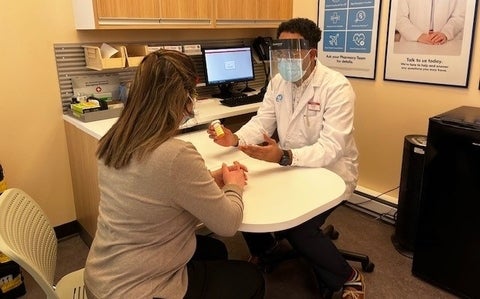
What can you do to be antiracist?
Alumnus Mohamed El Sheikh (above, right) shares his experiences as a Sudanese-Canadian pharmacist. Born in Sudan, Mo came to Canada with his family as a boy and has lived across the country and in the U.S. He graduated from the School of Pharmacy in 2020 and advocates for antiracism in health-care education and practice.
By Mohamed El Sheikh, PharmD 2020
A while back I was on my way to work when a vehicle drove by, and someone yelled a racial slur at me.
Shocking, right?
Truthfully, it made me laugh. Not because it was funny, but because it was so ridiculous that I didn’t spare it a second thought. Blatant actions like that don’t bother me much. It is the covert, built-in discrimination, as well as the doubt that such discrimination may or may not be there, that does.
Covert racism plants the seeds of doubt
My dad inspired me to be a pharmacist. He was an international graduate who immigrated to Canada when I was young. He worked hard and found success, and I saw how he supported his community. He was the only Black pharmacist I knew, and I saw how appreciative his patients of colour were to be treated by a pharmacist who understood the barriers that something as trivial as skin colour can cause.
Back home, we refer to both pharmacists and physicians as doctors in casual conversation. Pharmacists are trusted and accessible professionals who can provide care especially to the disenfranchised – those without a family doctor, with a lower income or limited access to healthcare.
I wanted to be that health-care provider for others, and I worked hard to achieve that goal. I faced barriers along the way – as one of few Black students in my cohort, there were times when I felt isolated. I experienced those covert acts of racism, called microaggressions, that made me doubt myself as a clinician.
Here's an example. One day, I arrived at work and hadn’t yet put on my lab coat. I was heading behind the counter when a patient told me that I “can’t go back there.”
An innocent observation. Perhaps they weren’t thinking about the impact a statement like that can have on a marginalized person. Every time I hear phrases like that, I replay them in my mind. Should I have told them how hard I had worked to be there? Was this even based on my skin colour? Was it an innocent remark, was it racist, or was I just being dramatic?
It’s as if we begin to gaslight our own thoughts. “Keep doing your job,” we tell ourselves. “You’ll be ok, things like this don’t happen in 2022.”
The sad truth is that they do. Not always, and not always intentionally, but they do. It shakes me knowing that distinguished, hardworking, and intelligent professionals might doubt themselves simply because of the colour of their skin. Our goal as health-care professionals is to focus on our patients, but often this results in us leaving our own feelings and responses to implicit racism behind.
Antiracism is an active process

So what can we do to support each other and our patients of colour?
As pharmacists, we are afforded incredible trust from our patients. It is our duty to do what is best for them with that trust. That includes learning about the nuanced topics that affect patients individually. Informed care starts with education, and constantly being cognizant of the intersectional identities that make up our patients.
Mohamed standing in a private counselling room wearing a lab coat
I am still early in my career. I have much to learn myself. Here are strategies I’ve found helpful in my own journey:
- Build a personal network for antiracism conversations. As a student and professional, I’ve reached out to other students, pharmacists, clinicians and community members who are active in the space and have open and honest conversations about racism. These connections inspire me and give me ideas for growth.
- There are so many resources out there to educate yourself. Get reading and learning. Mind the Gap by Malone Mukwende, Peter Tamony and Margot Turner is a book I’ve found helpful as a clinician.
- Remember that antiracism is an active process that requires constant effort and education. How to Be Antiracist by Ibram X. Kendi shares ideas on how to do this.
The knowledge we gain and discussions we have help us become informed, better clinicians. We all can learn something to better support our patients and colleagues.
Today, I am a pharmacist at Shoppers Drug Mart in Waterloo. I love what I do, but I never stop pushing for more Black representation in pharmacy and more education and care surrounding Black and marginalized patients.